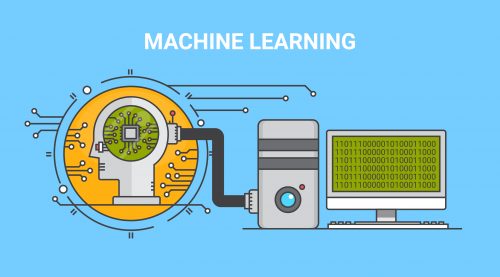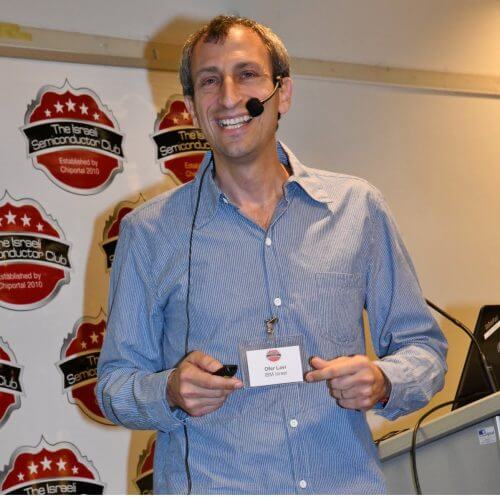This is what Ofer Lavi, manager of the machine learning group at IBM's research laboratories in Haifa, says at the meeting of the Israeli chip club that took place in Tel Aviv and dealt with developments in the field of artificial intelligence.

"We need to take the computer and empower the person, not replace him." This is what Ofer Lavi, manager of the machine learning group at IBM's research labs in Haifa, says at the meeting of the Israeli chip club that dealt with developments in the field of artificial intelligence.
"Could we be harmed by the robotics revolution?" Lavi asked the audience, which consisted mostly of executives in the chip industry. "We are not fast food cooks, not farmers, not postmen, not electronics technicians. We don't sell flowers and we don't sell plane tickets to the few people who still don't do it themselves. We have learned a lot and we must be creative to succeed. Artificial intelligence is not replacing professions such as lawyers in the meantime, but it is definitely changing these professions."
"The amount of data in the world today is enormous, by 2020 we expect that each of us will generate 1.7 megabytes of data every minute. For example, in the field of health there is a lot of data, a watch like an iwatch, but most of the data is unstructured data. Not every ex seconds I have a measurement of the heart but abstract things CT images or films. Each of us will create information equivalent to 300 million books."
"Today there is software code at all levels - from the cloud to the FIREMEWARE that sits next to the chip. Every car that leaves the factory has 100 million lines of code, most of it thanks to artificial intelligence. Today's televisions are also smart. All these smart things contain machine learning capabilities in the background.”
"In normal code, programmers give the script or the instructions to the computer in a very structured way and therefore have to give the computer instructions in advance what to do in any case even in extreme cases. Machine learning works with a different method, for example it is given blood samples of healthy people and of sick people, the next time it will know to decide for itself whether the person is healthy or sick. We are now in an era of transition from narrow artificial intelligence to broader artificial intelligence. The next step - general artificial intelligence in the style of science fiction films is still far away."

"Narrow artificial intelligence - a system that makes classifications according to a predefined task, but the system will not know how to decide more than the narrow question - if we take the previous example of whether the person is healthy or not. When talking about a broader artificial intelligence, the system will be able to move from one complex to another, to recognize different types of complex situations. An example of this is the Apple speaker. The microphone picks up what is being said in the room and sends it to the cloud for natural language processing, and performs the action requested by those present in the room. Large-scale machine learning would be needed to place such a system in a meeting room to transcribe the conversations, but companies are hesitant to bring a system that will hear everything they say into their facilities."
"IBM as a company that develops for businesses has to use a much smaller volume of data. We do not collect data from cell phones or autonomous cars. Customers also impose restrictions on the use of their data. We need to rely on fewer samples, and also take care of transfer from client to client without revealing anything from the first client. In the health sector this is problematic because of the GDPR standard and the need for information security and privacy. Nevertheless, robots have a role in hospitals, replacing the nurses with simple questions such as when the visiting hours are or requests such as turning on or off a light. In Japan, they developed a robot that simulates a brother or sister that is also able to carry the patient from place to place."
"Prof. Marvin Minsky, one of the fathers of the field of artificial intelligence, said that if a computer does something we would not expect from it - it is artificial intelligence. Today people expect this - and this is the transition from narrow artificial intelligence to broad artificial intelligence. Wise, for example, he knows that I go to work in the morning, because he learned my travel pattern and I don't have to tell him that." Lavi explained.
Lavi later described the powerful computers that BAM developed together with NVIDIA to speed up artificial intelligence calculations, and also referred to the next generation of computing that will be able to do this much faster - the quantum computers. Instead of AND and OR, you can build a large number of logic gates working on quantum bits or qubits. IBM has built a 5 qubit quantum computer and anyone can run programs on it in a language designed for quantum computing.

3 תגובות
Who even asks humans if we help them or replace them? Until we take control of all the energy that the sun emits in all directions, we depend on the sources of energy that can be concentrated on the surface of the earth. You are just disturbing and wasting the few resources here.
Understand how complex the challenge of a medical intelligence system is: it needs a higher accuracy than an expert doctor for decoding
in a positive direction. Do not miss a patient. The level of accuracy of an expert MRI decoder, for example, seems to me to be 93%.
It preferably needs a high precision number in the negative direction. Do not generate too many false alerts that the system determines sick and the person is not sick. It's less serious, it costs money.
The problem with this is that it makes available super interesting research, such beautiful mathematics, and such strong engineering, and a good salary for those involved in the field. Since it cannot be stopped - you just have to see the child professors at the most powerful universities in the world: Stanford, Berkeley, Princeton, and Toronto - the capital city of artificial intelligence where Professor Joshua Bengio sits - one of the 3 gurus, Professor Jeffrey Hinton - the greatest of them all, and I think also Professor Jan LeCun - the one who invented deep learning in 1998. And Alex Krichevsky from Toronto - who developed the first deep learning network in 2012, and somehow - a case of academic injustice, forgotten. The child professors (age 269, including these Iranians) come from Asian and African countries - and this research lifted them out of poverty into something much greater. They are influential on a global level. I personally got to apply a model developed by an Iranian from Stanford. I once contacted him for research data and he did not answer me. The Chinese do They answered me. I asked myself if it was because of the Israel-Iran conflict or because he didn't want me to apply the model he developed and continue from there. I really continued. I reduced the calculation infrastructure by 70% to obtain the same capability, of course I changed the architecture.
Passwords. The oligarchs develop this intelligence for financial gain. An intelligence system for deciphering MRI on a specific topic at a high level from a specialist doctor. An MRI decoder receives NIS 1500 for decoding. They earn up to 150000 NIS per month - for health. Such a software system that is sold to hospitals - there is no need for an expert. At first they say it is to empower the person. But the truth, and by the way I am both a developer of elite intelligence, and also basic research - currently semi-independent in the company I work for, in the future probably in universities, is that it replaces.